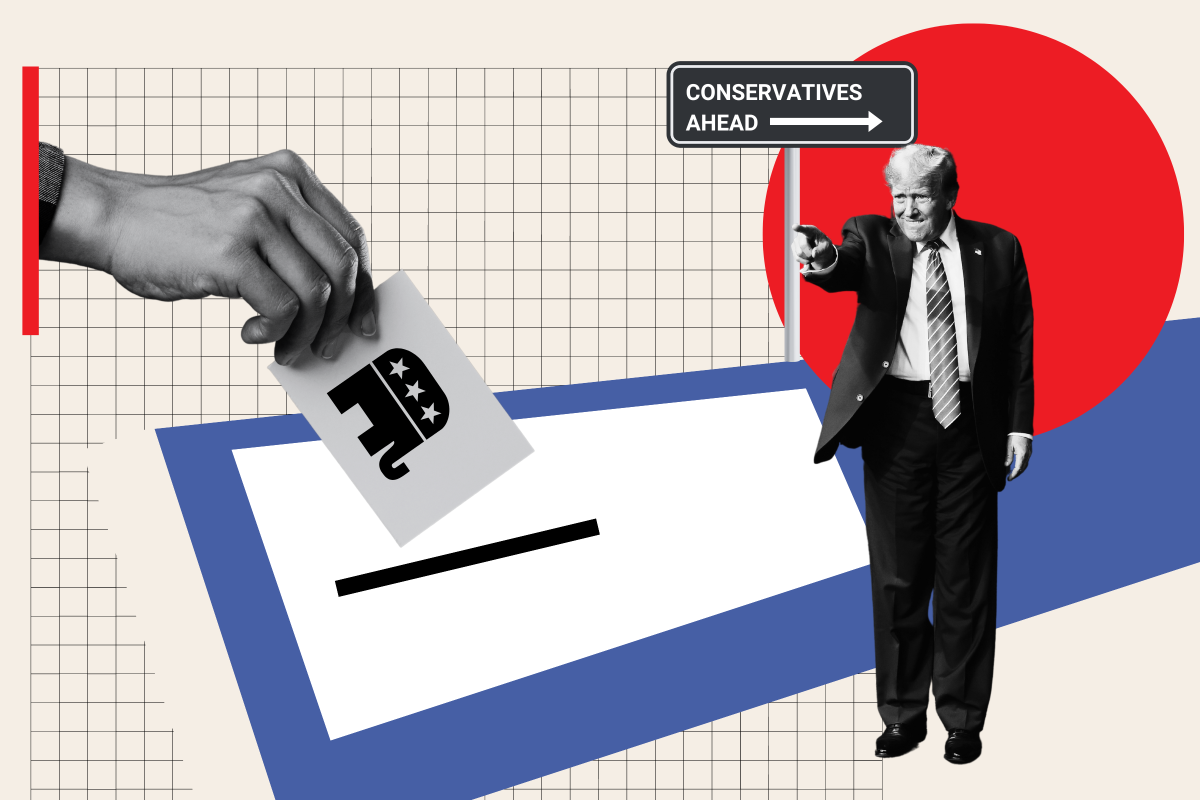Nearly four in 10 people who voted for Donald Trump in 2020 have become more conservative in the past five years, according to a poll conducted exclusively for Newsweek.
The results, perhaps echoing Trump's increasingly strident recent rhetoric, including a social media post at the end of last month appearing to show President Joe Biden hog-tied, may indicate that his appeal to his base is solidifying. Some of his supporters appear to have been encouraged to move further right by the legal cases against him, the polling found, as well as by hot-button issues like inflation and immigration.
However, the Redfield & Wilton Strategies survey also shows that nearly two in 10 Trump voters have moved further to the left, suggesting increasing polarization even among his own supporters. This could pose a problem for Trump in November's general election, with some such voters, including supporters of defeated Republican hopeful Nikki Haley, either choosing not to vote or backing an independent candidate in protest.
One political strategist told Newsweek that the results showed it was "increasingly difficult" for the Republican Party to find broad-based appeal.
Marc Thiessen, former chief speechwriter for President George W. Bush, has previously noted that Trump lost the key swing state of Georgia in 2020 by fewer than 12,000 votes—a state in which Haley received 77,000 votes in March's primary.

What The Polling Shows
Overall, the survey of 1,500 eligible voters found that the ideology of 23 percent in total had moved further to the right since 2019, including 37 percent of those who voted for Trump at the last election.
The results also show that 19 percent of Trump supporters said they have become more liberal (11 percent) or more socialist (7 percent) in the past five years, with 29 percent saying their political ideology had not changed.
More than a third (37 percent) said Trump's time in office prompted their change in ideology over the past five years, with 22 percent citing Biden's current time in the White House.
Other factors cited by Trump supporters for changing their political ideology include inflation (36 percent), the cost of living crisis (33 percent) and immigration (32 percent), all of which are set to be hot topic issues in the 2024 presidential race.
More than one in five (21 percent) said that "woke culture" has seen their political views shift. Nearly the same amount of Trump supporters (19 percent) said that the former president's ongoing legal battles, including facing 91 felony charges across four criminal cases, have resulted in their political ideologies moving.
Trump, who has pleaded not guilty to all charges against him, has frequently accused the state and federal investigations of being politically motivated "witch hunts" which aim to hinder his chances of winning the 2024 election.
In a press conference on Monday, Trump rejected the idea that a possible conviction in the falsifying business records trial, which will start on April 15, could damage his White House hopes.
"Or it could also make me more popular, because the people know it's a scam," Trump said.
Trump's office has been contacted for comment via email.
'A Significant Challenge for the Republican Party'
Denny Salas, political strategist and senior vice president of lobbying and communications firm Gotham Government Relations, said the GOP in general becoming more conservative can be linked back to former Alaska Governor Sarah Palin being chosen as John McCain's running mate in 2008.
"Palin's nomination helped mainstream ultra-conservative ideas and paved the way for the rise of the Tea Party movement, which ultimately forced Speaker John Boehner's resignation and Speaker Paul Ryan's early retirement. This shift to the right also fueled the 'birther' conspiracy theory, which was pushed by then-private citizen Donald Trump, further eroding the party's commitment to a shared set of facts," Salas told Newsweek.
"Trump's subsequent presidency continued this trend, with his administration promoting questionable narratives around issues like military gold star families, immigration, and even COVID-19 vaccines. The former president's willingness to create his own 'alternative facts,' espoused by his White House's senior counselor, Kellyanne Conway, resonated with a significant portion of his base, leading them to drift even further to the conservative fringe.
"As we approach the 2024 election, this hardening of ideological positions among Trump's supporters could pose a significant challenge for the Republican Party, making it increasingly difficult for them to appeal to a broader electorate," Salas added.
The Redfield & Wilton Strategies survey also found that 31 percent of those taking part have not seen their political ideology change in the past five years, with more than a quarter becoming more liberal (17 percent) or socialist (6 percent).
A total of 13 percent of those who voted for Biden in 2020 said they have become more conservative since 2019, with 29 percent saying they have become more liberal and 33 percent saying their political ideology has not changed.
The Redfield & Wilton Strategies survey was conducted between March 23-24.
Update, 4/2/24, 5:15 p.m. ET: This article was updated with additional information.
Uncommon Knowledge
Newsweek is committed to challenging conventional wisdom and finding connections in the search for common ground.
Newsweek is committed to challenging conventional wisdom and finding connections in the search for common ground.
fairness meter
To Rate This Article
About the writer
Ewan Palmer is a Newsweek News Reporter based in London, U.K. His focus is reporting on US politics, domestic policy ... Read more





